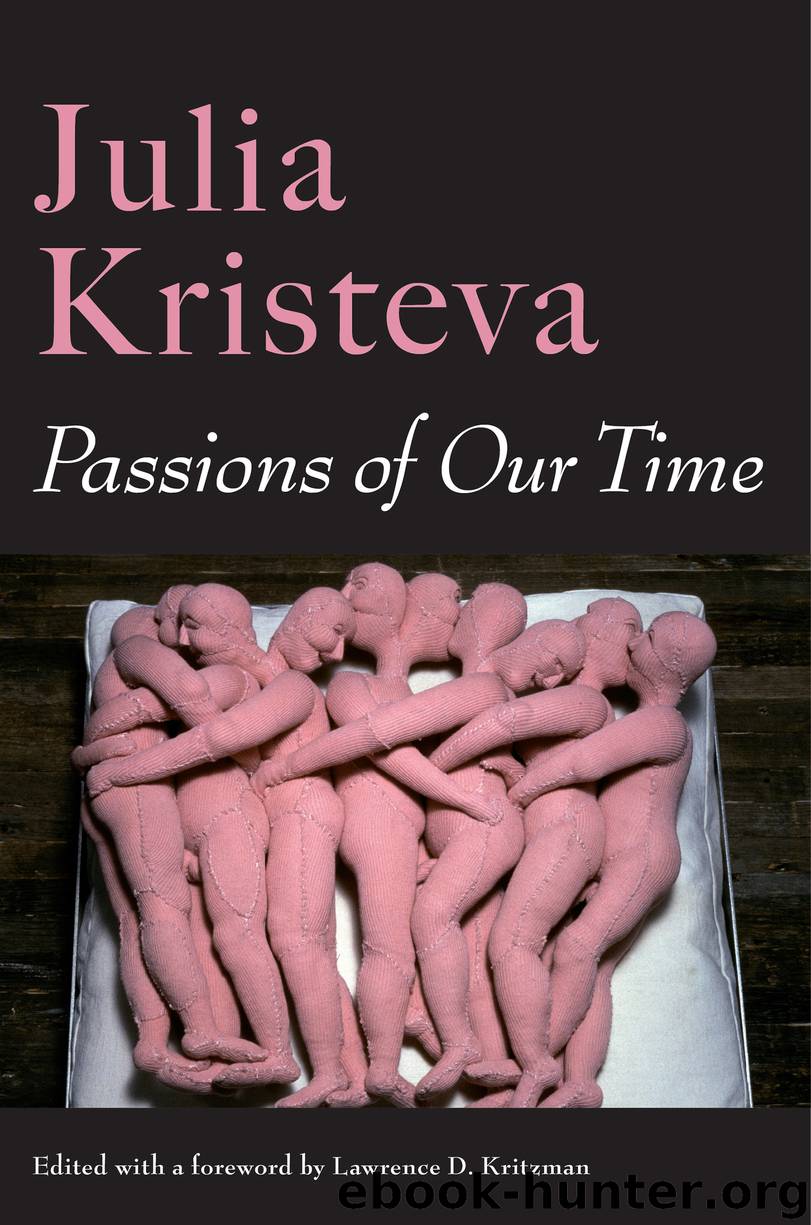Passions of Our Time by Julia Kristeva

Author:Julia Kristeva
Language: eng
Format: epub
Publisher: Columbia University Press
16
SPEECH, THAT EXPERIENCE
When the search for God takes place intrinsically in language, does it not immediately open the way to the immanent becoming of transcendence?
Because I speak, my search for God—Love and Word—can only be a loving discourse. I seek myself in Him (“Seek yourself in Me,” says the Creator to Teresa of Avila, before she finds him in her “muy interior”); “I” seeks itself in speaking the Word, and my God becomes my language.
A crossroads then appears at this point if the seeker dares to forget that his quest leads to Christ. Either I lock language in the absolute triumph of my “subjective arbitrariness” and strangle myself in a sort of newspeak or even in its totalitarian politics that George Orwell had already diagnosed and that Benedict XVI had rightly feared in his speech at the College des Bernardins.1 Or I build my lab in the Word-Flesh in which I probe the acoustic vibrations and organs, I re-create its intelligence and passions, its prosody and narration, its concepts and silences: “I am the journey,”2 just as much by writing as in psychoanalysis. And yet, as I practice its mysteries, the Word-Flesh dispossesses and alters me: no more lab! I thought my language was my own, but it turns out to be foreign, other than me in me. Am I its author or its product? Unless it transcends me infinitely, insistent infinity in the little point that I am, infinitesimal St. Teresa, acknowledged precursor of Leibniz’s infinitesimal calculus.
If it is true that “in the beginning was the Word” that “was made Flesh,” then a new experience of speech in fact did constitute itself two thousand years ago. With its two sides—Erlebnis, the dazzling burst of the unnamable, and Erfahrung, the patient appropriation of a new object by the new subject—the experience of language opening up the originating path of religion. Before realizing that it could also be its sublimation: “I am not thinking of a substitute for religion; this need must be sublimated,” specified Freud.3 “Credo experto,” because “Ego effectus est,” St. Bernard de Clairvaux had already said4 (but have they heard him, under the restored vaults of the Bernardins?), by imposing on Europe and, for the first time ever on the world, the idea that man is a loving subject (the troubadours were his contemporaries), and no less a warrior (he took the road to Jerusalem with the Second Crusade). Lover, meaning “deified” (because “completely submitted to the spirit”), and yet pathetic because refractory (with his “body-cow” in the “region of dissimilarity” in relation to God). For this twelfth-century man, who commented on the Song of Songs for eighteen years, experience is indistinguishable from the language of loving knowledge. And since the experience of speech is the other name for the search for God, Bernard continued to unfold its meanings, connotations, and metaphors in the accumulation of biblical and evangelical texts. Not yet a culture, necessarily communitarian, but more than a culture by the singular genius it requires in
Download
This site does not store any files on its server. We only index and link to content provided by other sites. Please contact the content providers to delete copyright contents if any and email us, we'll remove relevant links or contents immediately.
Rewire Your Anxious Brain by Catherine M. Pittman(17589)
Talking to Strangers by Malcolm Gladwell(11877)
The Art of Thinking Clearly by Rolf Dobelli(8842)
Mindhunter: Inside the FBI's Elite Serial Crime Unit by John E. Douglas & Mark Olshaker(7834)
Becoming Supernatural by Dr. Joe Dispenza(7105)
Change Your Questions, Change Your Life by Marilee Adams(6641)
The Road Less Traveled by M. Scott Peck(6635)
Nudge - Improving Decisions about Health, Wealth, and Happiness by Thaler Sunstein(6633)
The Lost Art of Listening by Michael P. Nichols(6474)
Enlightenment Now: The Case for Reason, Science, Humanism, and Progress by Steven Pinker(6405)
Win Bigly by Scott Adams(6311)
Mastermind: How to Think Like Sherlock Holmes by Maria Konnikova(6236)
The Way of Zen by Alan W. Watts(5799)
Daring Greatly by Brene Brown(5641)
Grit by Angela Duckworth(4736)
Big Magic: Creative Living Beyond Fear by Elizabeth Gilbert(4723)
Men In Love by Nancy Friday(4323)
Flow by Mihaly Csikszentmihalyi(4052)
The Four Tendencies by Gretchen Rubin(4024)
